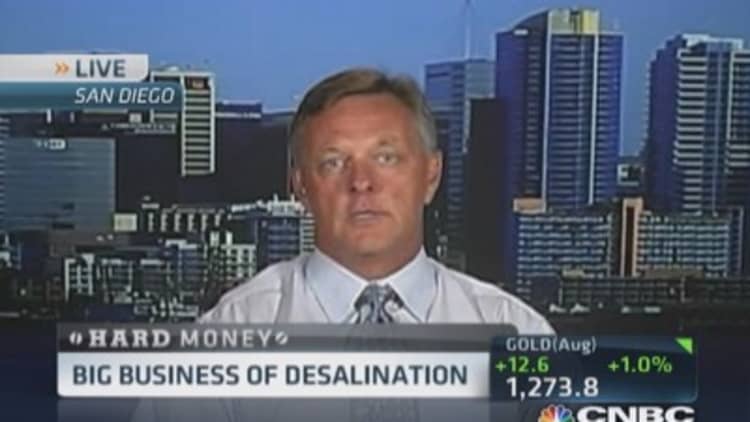U.S. water utilities face a critical economic squeeze, according to a new report—and that will likely mean higher prices at the water tap for consumers.
A survey by water-engineering firm Black & Veatch of 368 water utility companies across the country shows that 66 percent of them are not generating enough revenue to cover their costs.
To make up for the financial shortfall, prices for water are heading upward, said Michael Orth, one of the co-authors of the report and senior vice president at Black & Veatch.
"People will have to pay more for water to make up the falling revenues," he said. "And that's likely to be more than the rate of inflation."
Water prices have already inched higher since 2010. They've risen more this year, though less steeply than in previous years, according to water source monitor Circle of Blue and its annual survey of single-family residential water rates in 30 major U.S. cities.
Read MoreWarning: Many watersheds in US failing 'stress test'
The average price for a family of four using 100 gallons per person per day has increased 6.2 percent so far in 2014—the smallest year-to-year change in the five-year history of the survey.
However, since 2010, average water prices rose 33 percent for the index, the equivalent of adding $15 per month to a $45 water bill.
Irony of water conservation
The economic pressure on water companies is coming in large part from the ongoing drought in Southwestern states, said Back & Veatch's Orth. Many water sources are dry from lack of rainfall. That often means utilities must buy water elsewhere, which drives up the cost to consumers.
Farmers, too, are having to pay higher water prices from the drought, leading to higher food costs.
Perhaps ironically, efforts to encourage water conservation are also contributing to utilities' revenue problem, said Scott Huntley, a spokesman for the Las Vegas Valley Water District.
Read MoreWhy so many Americans don't care about the drought
"It's having a product to sell and then telling customers not to buy it," he said. "We encourage conservation, but it does mean less money for us."
Huntley explained that his utility, unlike many others, does not have to pay for water, since its water source is allocated from nearby Lake Mead. However, the costs of pumping water, filtering and distribution are fixed, and don't go down when water utilities hit rough economic patches.
Las Vegas Valley Water District has started to feel the effects of fewer consumer dollars, said Huntley. This past April, the utility laid off more than 100 people from its total workforce of 1,300.
Water systems need overhaul

Meanwhile, water utilities in the East and elsewhere, which are getting enough rainfall to beef up water supplies, have to deal with an older water delivery system with eroded and leaky pipes, said Black & Veatch's Orth. But funding for those improvements are not always easy to come by.
"A lot of cities and municipalities may be tapped out when it comes to issuing bond initiatives to fund needed changes to water infrastructure," Orth explained.
The federal government provides some low interest rate funding to states for water improvements, but it will take a bigger effort, Orth said.
"There needs to be more of a public-private partnership to make this all work," he said. But Orth added that it's tough for private capital to flow into water utilities while their revenues decrease.
No panic, yet
Orth went on to say that this is the third year in a row that water utility companies have said financial challenges are their No. 1 concern.
Read MoreNot even severe drought can stop fracking
For his part, Las Vegas Valley Water District's Huntley said he doesn't notice any panic about the situation. However, he admitted time may be running short.
"There's concern that we find a business model that fits," Huntley explained. "We do need to do something so we can have a solid revenue stream."
—By CNBC's Mark Koba


